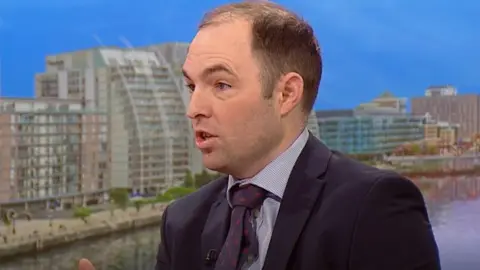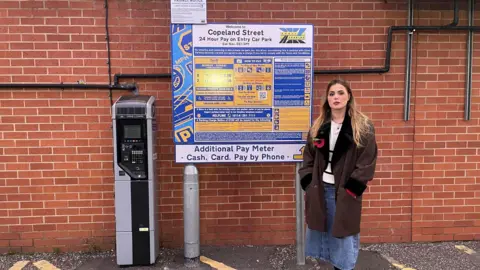BBC News, East Midlands
BBC News, Derby
 BBC
BBCPrivate parking rules are set to change to ensure motorists are not unfairly penalised if they do not pay within five minutes.
The sector’s code of practice was reviewed after the BBC reported on the case of Rosey Hudson, who was taken to court by Excel Parking over a £1,906 claim after taking longer than five minutes to pay at the Copeland Street car park in Derby due to poor signal on her phone.
Her case was eventually dropped, with other motorists raising similar concerns and seeing their claims discontinued.
Now the updated rules, to be brought in from Monday by the Private Parking Scrutiny and Advice Panel (PPSAP), will ensure “motorists who face genuine difficulties in paying in a short timeframe are treated fairly”.
The British Parking Association (BPA) and the International Parking Community (IPC) previously announced it had set up the panel to review the code of practice, following coverage of Miss Hudson’s case last year.
The new code of practice will mean that drivers using private car parks, monitored by camera technology such as CCTV and automatic number plate recognition (ANPR), will have a “safeguard” in place if they experience delays making payments.
Under the change, if motorists pay before they leave ANPR-managed pay on entry car parks, regardless of whether they pay within five minutes, they should not receive a penalty notice.
However, it “remains essential” for drivers to read signage carefully and follow the rules of the specific car park.
And the updated rules only apply to sites where technology supports this change, and does not apply to council car parks and private sites without camera monitoring.

IPC chief executive officer Will Hurley told the BBC the five-minute rule will end on 17 February.
“From then, it will stop,” he said. “We’ve put in place a panel that’s reviewed this over the last month and we’re making the change today because it is the right thing to do.
“There’s a safeguard now in those particular car parks where you go in and as long as you pay for parking, you won’t receive a parking charge.”
Mr Hurley said people should not be charged for parking if a driver enters the car park, fails to find a space and then leaves.
“It is crucial that there is a mechanism to identify and resolve issues quickly. I am pleased that the panel has acted swiftly to introduce safeguards for motorists,” he added.
Andrew Pester, chief executive of the BPA, added: “It is a real testament to the [panel] that this change has been implemented so efficiently. The parking sector is always striving to ensure it operates in the interest of compliant motorists and to ensure that parking is fairly managed for all.”
A group of MPs previously called on the government to introduce its own statutory code of practice that private car park operators must follow, adding that the private industry cannot be trusted to regulate itself.
Miss Hudson is one of several people Excel Parking took to court over its five-minute payment rule.
At the time, she said she was unable to pay while in the car park due to poor signal on her phone.
She walked to where she could get connected and paid the full tariff every time she parked there, but was still repeatedly sent parking charge notices (PCNs).
In December, Excel Parking dropped its case against her without explanation and did the same for Garry Kay, who parked at the same car park and was preparing to fight costs of £255.
Meanwhile, last month a judge ordered the operator to pay a Peter Barton £19.50 in expenses after he took 19 minutes to pay because he could not find a suitable parking space.
Miss Hudson, 31, told the BBC she was cautiously optimistic about the changes.

“I am pleased because my hope, in speaking out about my case, was that something would change,” she said.
“I wasn’t doing it just for me. There are lots of people in the same situation as me who don’t push back and pay these fines just to get the companies off their backs.
“They are being treated very unfairly by private parking firms, paying fines that are not reasonable.
“I hope the changes proposed are meaningful, and I do think it should be in all private car parks, not just some.”
The government said it would make an announcement on plans for a statutory parking code of practice “in due course”.
A Ministry of Housing, Communities and Local Government spokesperson said: “Motorists must be protected when using private car parks and we are determined to drive up standards in the industry.
“We know how much of an issue this is for drivers, which is why we will set out further details on the private parking code of practice as soon as possible.”

Analysis
By Caroline Lowbridge, BBC News
A lot has happened in the two and a half months since the BBC spoke to Rosey Hudson.
She originally contacted the BBC because she wanted to warn others about what was happening to her. She told us she was under a huge amount of stress as a result of legal proceedings by Excel Parking, and she didn’t want others to go through the same.
Miss Hudson’s story struck a chord with other motorists.
Hundreds of them contacted the BBC with their own stories of being issued with PCNs.
The two trade associations for private car park operators also announced their intention to end the so-called five-minute payment rule, and set up a panel to oversee changes to the sector’s own code of practice.
This sounded promising but parking campaigners and some MPs remain sceptical.
They believe the sector cannot regulate itself, adding the government needs to introduce a statutory code of practice.
A government spokesperson told the BBC it will set out details on this “as soon as possible”.
Meanwhile, drivers are still being threatened with legal action as a result of Excel Parking’s five-minute rule.
Some are challenging the PCNs and winning when the cases are heard in court, but others are paying up due to fear, or to avoid the stress and hassle of legal proceedings.
Excel Parking also remains insistent that Miss Hudson was in the wrong – despite its claim against her being discontinued.


